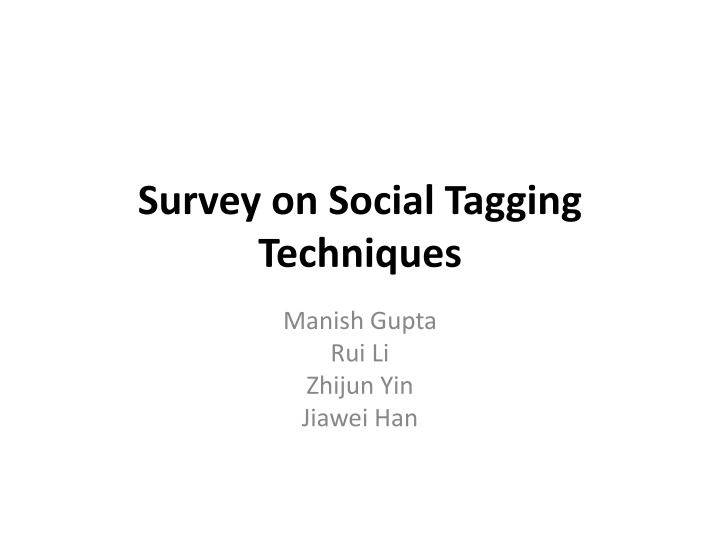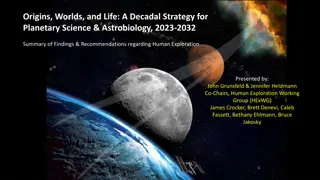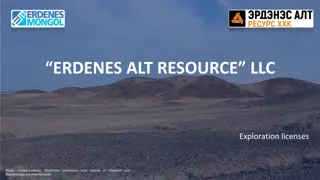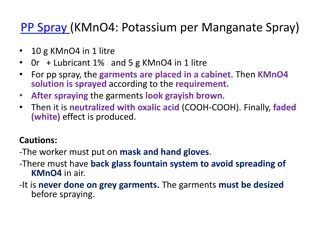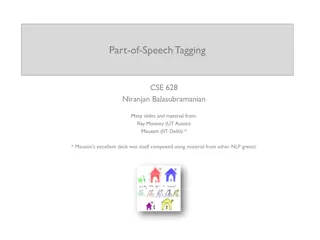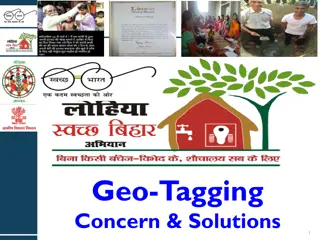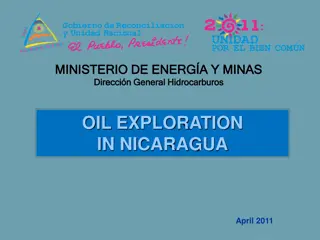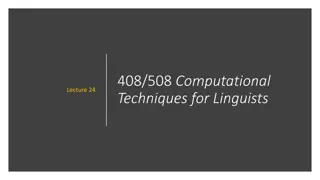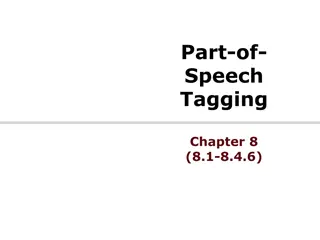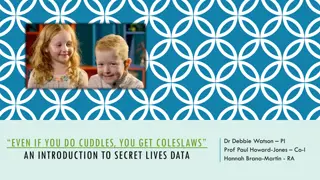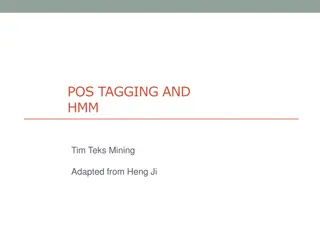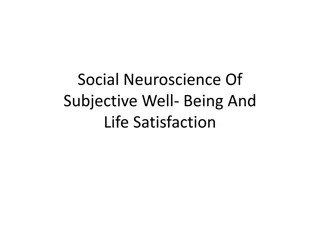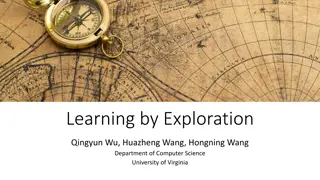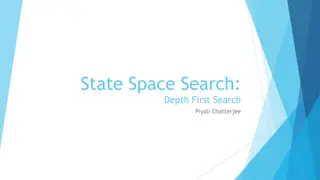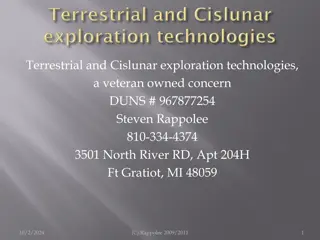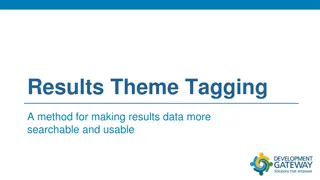An In-Depth Exploration of Social Tagging Techniques
Delve into the world of social tagging with a comprehensive survey covering topics like folksonomies, tag generation models, visualization, applications, and more, exploring the why and what of tagging behaviors.
Download Presentation

Please find below an Image/Link to download the presentation.
The content on the website is provided AS IS for your information and personal use only. It may not be sold, licensed, or shared on other websites without obtaining consent from the author.If you encounter any issues during the download, it is possible that the publisher has removed the file from their server.
You are allowed to download the files provided on this website for personal or commercial use, subject to the condition that they are used lawfully. All files are the property of their respective owners.
The content on the website is provided AS IS for your information and personal use only. It may not be sold, licensed, or shared on other websites without obtaining consent from the author.
E N D
Presentation Transcript
Survey on Social Tagging Techniques Manish Gupta Rui Li Zhijun Yin Jiawei Han
Outline Why folksonomies? Why do people tag? What do they tag? Tag generation models Tag analysis Visualization of tags Tag recommendations Applications of tags Tagging problems Conclusion
What is social tagging? Tag photos on Flickr Tag URLs on Delicious Tag blog posts on Blogger, Wordpress, Livejournal Hash tags on twitter Annotations on social networks like Orkut, Facebook Comment and tag events on event sites Tagging books on LibraryThing Tagging citations, reviews, news, multimedia, answers
Why taxonomies? Problems with Metadata Generation and Fixed Taxonomies Manual, expensive, different vocabulory fixed static taxonomies are rigid, conservative, and centralized post activation analysis paralysis Folksonomies as a Solution folksonomy (folk (people) + taxis (classification) + nomos (management)) emergent and iterative system
Tags: why and what? Different User Tagging Motivations Future Retrieval (toread) Contribution and Sharing Attract Attention Play and Competition Self Presentation (mystuff, myLaptop) Opinion Expression Task Organization (gtd, jobsearch) Social Signaling Money Technological Ease (Phonetags) Categorizers Versus Describers
Kinds of Tags Content-Based Tags (Autos, Honda, batman, Lucene) Context-Based Tags (location, time) Attribute Tags (Jeremy s Blog) Ownership Tags Subjective Tags (opinion, emotion) Organizational Tags (mywork, mypaper) Purpose Tags (learn_LATEX) Factual Tags (people, place, concepts) Personal Tags Self-referential tags (sometaithurts) Tag Bundles (tagging tags)
Linguistic Classification of Tags Functional (weapon) Functional collocation (furniture, tableware)) Origin collocation Function and origin Taxonomic (animalia, chordata) Adjective Verb Proper name
Tag Generation Models Factors users background knowledge previous tags suggested by others content of the resources Community influences Tag selection algorithm Polya Urn Generation Model Language Model Other Influence Factors
Tag Generation Models Basic Polya Urn Model Captures assigned tags but does not consider new tags Yule Simon Model New word (prob p), copied word (prob 1-p) frequency-rank distributions with a power law Yule Simon Model with Long Term Memory Copy using a distribution over past x time steps where probability decays as a power law. Information value based model Previous tag assignments+information value More parameters User background knowledge, number of previous tags the user has access to, most popular tags Language model Model generation of tags and words together using LDA-like model
Tagging distributions Tagging System Vocabulary growth follows power law Resource s Tag Vocabulary growth follows power law Resource s Tag Growth also follows power law Delicious: Tag frequency vs rank decreases with sudden drop at ranks 7-10 Probability distribution of number of tags contained in a posting versus the number of tags displays an initial exponential decay with typical number of tags as 3-4 and then becomes a power law tail with exponent as high as -3.5 Peak popularity, re-discovery and disappearance of bookmarked URLs Variation of the probability distribution of the vocabulary growth exponent for resources, as a function of their rank. This plot is a Gaussian curve. Users sets of distinct tags grow linearly as new resources are added. But sometimes user vocabulary growth declines with time.
Identifying tag semantics Analysis of Pairwise Relationships between Tags (inter tag correlation graphs) Extracting ontology from tags String matching Using wikipedia templates and categories Extracting place and event semantics Frequency of tags within different time/space windows at different granularities Tags versus keywords Tag coverage: Fraction of words in documents covered by tags. Tag match ratio
Visualization of tags Tag clouds for Browsing/Search Specific versus broad search; less cognitive load Popularity based skewness; multiple clicks;low recall Tag Selection for Tag Clouds Capacity to represent a resource Volume of covered resources K means (cluster and select representative) Tag Hierarchy Generation Using tag coverage, URL intersection rate etc to build parent/child relationships Tag Clouds Display Format Alphabetical order Related tags close together (cluster) Circular/rectangular, font sizes; inline HTML vs nested tables; white space minimization Tag Evolution Visualization Temporal evolution of tags; merging data from multiple time intervals Tag Cloud Demos Cloudalicious, Grafolicious, HubLog, PhaseTwo, Tag.alicio.us, Extisp.icio.us, Facetious
Tag Recommendations Using Tag Quality Topic coverage, popularity; discard personal tags Using Tag Co-occurrences Jaccard sim, reliability of tag, stability wrt users, descriptiveness of tags Using Mutual Information between Words, Documents and Tags Spectral Recursive Embedding over 2 bipartite graphs of words, documents and tags; ranking within clusters Using Object Features Relevance to image content (visual language model), content- based tags Tag Recommendation Quality Metric: Acceptance ratio
Applications of tags Indexing: Faster indexing; term discriminativeness Search: Social and semantic expansions for web search; personalized search; enterprise search; searching library catalogues Taxonomy generation Clustering and classification: Clustering using extended vector space model, classifying blog entries and general web objects Social interest discovery: User profiling, current popular event discovery Enhanced Browsing: tag clouds; popularity driven browsing, filtering Integrated folksonomies: cross linking distributed user tags
Tagging problems Spamming Spamming models Spam and spamming user detection Canonicalization and Ambiguities Acronyms, conventions, synonyms, multiword tags Levels of abstraction Solutions: Merge different forms, recommend tags, error checking, discussion tools Sparsity of tags No consensus Search inefficiency
Conclusion and future directions We presented a survey covering various aspects of social tagging We discussed topics like why people tag, what influences the choice of tags, how to model the tagging process, kinds of tags, different power laws observed in tagging domain, how tags are created, how to choose the right tags for recommendation. More work can be done on analysis of tags in microblogs, improving tagging system design, personalized tag recommendations, generating more applications and building more effective solutions to tagging problems.
References Morgan Ames and Mor Naaman. Why we tag: Motivations for annotation in mobile and online media. In Conference on Human Factors in Computing Systems, CHI 2007, San Jose, CA, April 2007. Shenghua Bao, Guirong Xue, Xiaoyuan Wu, Yong Yu, Ben Fei, and Zhong Su. Optimizing web search using social annotations. In WWW '07: Proceedings of the 16th international conference on World Wide Web, 501-510, New York, NY, USA, 2007. Grigory Begelman, Philipp Keller, and Frank Smadja. Automated tag clustering: Improving search and exploration in the tag space, 2006. K.~Bielenberg. Groups in Social Software: Utilizing Tagging to Integrate Individual Contexts for Social Navigation. Master's thesis, 2005. David~M. Blei, Andrew~Y. Ng, and Michael~I. Jordan. Latent dirichlet allocation. J. Mach. Learn. Res., 3:993-1022, 2003. Christopher~H. Brooks and Nancy Montanez. Improved annotation of the blogosphere via autotagging and hierarchical clustering. In WWW '06: Proceedings of the 15th international conference on World Wide Web, 625-632, New York, NY, USA, 2006. ACM Press. David Carmel, Haggai Roitman, and Elad Yom-Tov. Who tags the tags?: a framework for bookmark weighting. In CIKM '09: Proceeding of the 18th ACM conference on Information and knowledge management, 1577-1580, New York, NY, USA, 2009. Luigi~Di Caro, K.~Sel Candan, and Maria~Luisa Sapino. Using tagflake for condensing navigable tag hierarchies from tag clouds. In Ying Li, Bing Liu, and Sunita Sarawagi, editors, KDD, pages 1069-1072. ACM, 2008. Ciro Cattuto, Andrea Baldassarri, Vito D.~P. Servedio, and Vittorio Loreto. Vocabulary growth in collaborative tagging systems, Apr 2007. Ciro Cattuto, Vittorio Loreto, and Luciano Pietronero. Semiotic dynamics and collaborative tagging. Proceedings of the National Academy of Sciences (PNAS), 104(5):1461-1464, January 2007. Klaas Dellschaft and Steffen Staab. An epistemic dynamic model for tagging systems. In HT '08: Proceedings of the nineteenth ACM conference on Hypertext and hypermedia, 71-80, New York, NY, USA, 2008. ACM. Nicholas Diakopoulos and Patrick Chiu. Photoplay: A collocated collaborative photo tagging game on a horizontal display. Pavel~A. Dmitriev, Nadav Eiron, Marcus Fontoura, and Eugene Shekita. Using annotations in enterprise search. In WWW '06: Proceedings of the 15th international conference on World Wide Web, 811-817, New York, NY, USA 2006. ACM. Micah Dubinko, Ravi Kumar, Joseph Magnani, Jasmine Novak, Prabhakar Raghavan, and Andrew Tomkins. Visualizing tags over time. In WWW '06: Proceedings of the 15th international conference on World Wide Web, 193-202, New York, NY, USA, 2006. ACM Press. Scott Golder and Bernardo~A. Huberman. The structure of collaborative tagging systems, Aug 2005.
References Marieke Guy and Emma Tonkin. Folksonomies: Tidying up tags? D-Lib Magazine, 12, Jan 2006. Harry Halpin, Valentin Robu, and Hana Shepherd. The complex dynamics of collaborative tagging. In WWW '07: Proceedings of the 16th international conference on World Wide Web, 211-220, New York, NY, USA, 2007. ACM. Y.~Hassan-Montero and V.~Herrero-Solana. Improving tag-clouds as visual information retrieval interfaces. In InScit2006: International Conference on Multidisciplinary Information Sciences and Technologies, 2006. M.~Heckner, M.~Heilemann, and C.~Wolff. Personal information management vs. resource sharing: Towards a model of information behaviour in social tagging systems. In Int'l AAAI Conference on Weblogs and Social Media (ICWSM), San Jose, CA, USA, May 2009. Paul Heymann and Hector Garcia-Molina. Collaborative creation of communal hierarchical taxonomies in social tagging systems. Technical Report 2006-10, Stanford University, April 2006. Paul Heymann, Georgia Koutrika, and Hector Garcia-Molina. Can social bookmarking improve web search? In WSDM '08: Proceedings of the international conference on Web search and web data mining, 195-206, New York, NY, USA, 2008. ACM. Andreas Hotho, Robert J hke, Christoph Schmitz, and Gerd Stumme. Information retrieval in folksonomies: Search and ranking. The Semantic Web: Research and Applications, 411-426, 2006. Jon Iturrioz, Oscar Diaz, and Cristobal Arellano. Towards federated web2.0 sites: The tagmas approach. In Tagging and Metadata for Social Information Organization Workshop, WWW07, 2007. Owen Kaser and Daniel Lemire. Tag-cloud drawing: Algorithms for cloud visualization, May 2007. Margaret E.~I. Kipp and Grant~D. Campbell. Patterns and inconsistencies in collaborative tagging systems : An examination of tagging practices. In Annual General Meeting of the American Society for Information Science and Technology. American Society for Information Science and Technology, November 2006. Georgia Koutrika, Frans~A. Effendi, Zolt'n Gy\"ongyi, Paul Heymann, and Hector~G. Molina. Combating spam in tagging systems: An evaluation. ACM Trans. Web, 2(4):1-34, 2008. Christian K r. Understanding the motivation behind tagging. ACM Student Research Competition - Hypertext 2009, July 2009. Liz Lawley. social consequences of social tagging. Web article, 2005. Rui Li, Shenghua Bao, Yong Yu, Ben Fei, and Zhong Su. Towards effective browsing of large scale social annotations. In WWW '07: Proceedings of the 16th international conference on World Wide Web, 943-952, New York, NY, USA, 2007. ACM.
References Xin Li, Lei Guo, and Yihong~E. Zhao. Tag-based social interest discovery. In WWW '08: Proceeding of the 17th international conference on World Wide Web, 675-684, New York, NY, USA, 2008. ACM. Dong Liu, Xian~S. Hua, Linjun Yang, Meng Wang, and Hong~J. Zhang. Tag ranking. In WWW '09: Proceedings of the 18th international conference on World wide web, 351-360, New York, NY, USA, April 2009. ACM. Cameron Marlow, Mor Naaman, Danah Boyd, and Marc Davis. Ht06, tagging paper, taxonomy, flickr, academic article, toread. In HYPERTEXT '06: Proceedings of the seventeenth conference on Hypertext and hypermedia, 31- 40, New York, NY, USA, 2006. ACM. A.~Mathes. Folksonomies - cooperative classification and communication through shared metadata. Computer Mediated Communication, December 2004. David~R. Millen and Jonathan Feinberg. Using social tagging to improve social navigation. In Workshop on the Social Navigation and Community based Adaptation Technologies, 2006. Michael~G. Noll and Christoph Meinel. The metadata triumvirate: Social annotations, anchor texts and search queries. WI/IAT '08: Web Intelligence and Intelligent Agent Technology, IEEE/WIC/ACM International Conference on, 1:640-647, 2008. Simon Overell, B\"orkur Sigurbj\"ornsson, and Roelof van Zwol. Classifying tags using open content resources. In WSDM '09: Proceedings of the Second ACM International Conference on Web Search and Data Mining, 64-73, New York, NY, USA, 2009. ACM. Lars Pind. Folksonomies: How we can improve the tags. Web article, 2005. Peter Pirolli. Rational analyses of information foraging on the web. Cognitive Science, 29(3):343-373, 2005. Emanuele Quintarelli. Folksonomies: power to the people. Daniel Ramage, Paul Heymann, Christopher~D. Manning, and Hector~G. Molina. Clustering the tagged web. In WSDM '09: Proceedings of the Second ACM International Conference on Web Search and Data Mining, 54-63, New York, NY, USA, 2009. ACM. Tye Rattenbury, Nathaniel Good, and Mor Naaman. Towards automatic extraction of event and place semantics from flickr tags. In SIRIR '07: Proceedings of the 30th annual international ACM SIGIR conference on Research and development in information retrieval, pages 103-110, New York, NY, USA, 2007. ACM Press. Terrell Russell. cloudalicious: folksonomy over time. In JCDL '06: Proceedings of the 6th ACM/IEEE-CS joint conference on Digital libraries, 364-364, New York, NY, USA, 2006. ACM. Ralf Schenkel, Tom Crecelius, Mouna Kacimi, Sebastian Michel, Thomas Neumann, Josiane~X. Parreira, and Gerhard Weikum. Efficient top-k querying over social-tagging networks. In SIGIR '08: Proceedings of the 31st annual international ACM SIGIR conference on Research and development in information retrieval, pages 523-530, New York, NY, USA, 2008. ACM.
References Christoph Schmitz, Andreas Hotho, Robert J hke, and Gerd Stumme. Mining association rules in folksonomies. In Data Science and Classification, 261- 270. Springer, 2006. Shilad Sen, Shyong~K. Lam, Al~Mamunur Rashid, Dan Cosley, Dan Frankowski, Jeremy Osterhouse, F.~Maxwell Harper, and John Riedl. tagging, communities, vocabulary, evolution. In CSCW '06: Proceedings of the 2006 20th anniversary conference on Computer supported cooperative work, 181-190, New York, NY, USA, November 2006. ACM. B r Sigurbj son and Roelof van Zwol. Flickr tag recommendation based on collective knowledge. In WWW '08: Proceeding of the 17th International Conference on World Wide Web, 327-336, New York, NY, USA, 2008. ACM. Herbert~A. Simon. On a class of skew distribution functions. Biometrika, 42(3/4):425-440, 1955. James Sinclair and Michael Cardew-Hall. The folksonomy tag cloud: when is it useful? J. Inf. Sci., 34(1):15-29, 2008. Yang Song, Ziming Zhuang, Huajing Li, Qiankun Zhao, Jia Li, Wang~C. Lee, and C.~Lee Giles. Real-time automatic tag recommendation. In SIGIR '08: Proceedings of the 31st annual international ACM SIGIR conference on Research and development in information retrieval, pages 515-522, New York, NY, USA, 2008. ACM. Lucia Specia and Enrico Motta. Integrating folksonomies with the semantic web. In ESWC '07: Proceedings of the 4th European conference on The Semantic Web, 624-639, Berlin, Heidelberg, 2007. Springer-Verlag. Louise~F. Spiteri. Structure and form of folksonomy tags: The road to the public library catalogue. Webology, 4(2, Artikel 41), 2007. Martin Szomszor, Ivan Cantador, and Harith Alani. Correlating user profiles from multiple folksonomies. In ACM Conference on Hypertext and Hypermedia, June 2008. Csaba Veres. The language of folksonomies: What tags reveal about user classification. In Natural Language Processing and Information Systems, volume 3999/2006 of Lecture Notes in Computer Science, 58-69, Berlin / Heidelberg, July 2006. Springer. Robert Wetzker, Carsten Zimmermann, and Christian Bauckhage. Analyzing social bookmarking systems: A del.icio.us cookbook. In Proceedings of the ECAI 2008 Mining Social Data Workshop, 26-30. IOS Press, 2008. Lei Wu, Linjun Yang, Nenghai Yu, and Xian~S. Hua. Learning to tag. In WWW '09: Proceedings of the 18th international conference on World wide web, 361-370, New York, NY, USA, 2009. ACM. Shengliang Xu, Shenghua Bao, Ben Fei, Zhong Su, and Yong Yu. Exploring folksonomy for personalized search. In SIGIR '08: Proceedings of the 31st annual international ACM SIGIR conference on Research and development in information retrieval, pages 155-162, New York, NY, USA, 2008. ACM. Zhichen Xu, Yun Fu, Jianchang Mao, and Difu Su. Towards the semantic web: Collaborative tag suggestions. In WWW2006: Proceedings of the Collaborative Web Tagging Workshop, Edinburgh, Scotland, 2006.
References Zhijun Yin, Rui Li, Qiaozhu Mei, and Jiawei Han. Exploring social tagging graph for web object classification. In KDD '09: Proceedings of the 15th ACM SIGKDD international conference on Knowledge discovery and data mining, 957-966, New York, NY, USA, 2009. ACM. Ding Zhou, Jiang Bian, Shuyi Zheng, Hongyuan Zha, and C.~Lee Giles. Exploring social annotations for information retrieval. In WWW '08: Proceeding of the 17th international conference on World Wide Web, 715-724, New York, NY, USA, 2008. ACM. Arkaitz Zubiaga. Enhancing navigation on wikipedia with social tags. In Wikimania '09, 2009.
